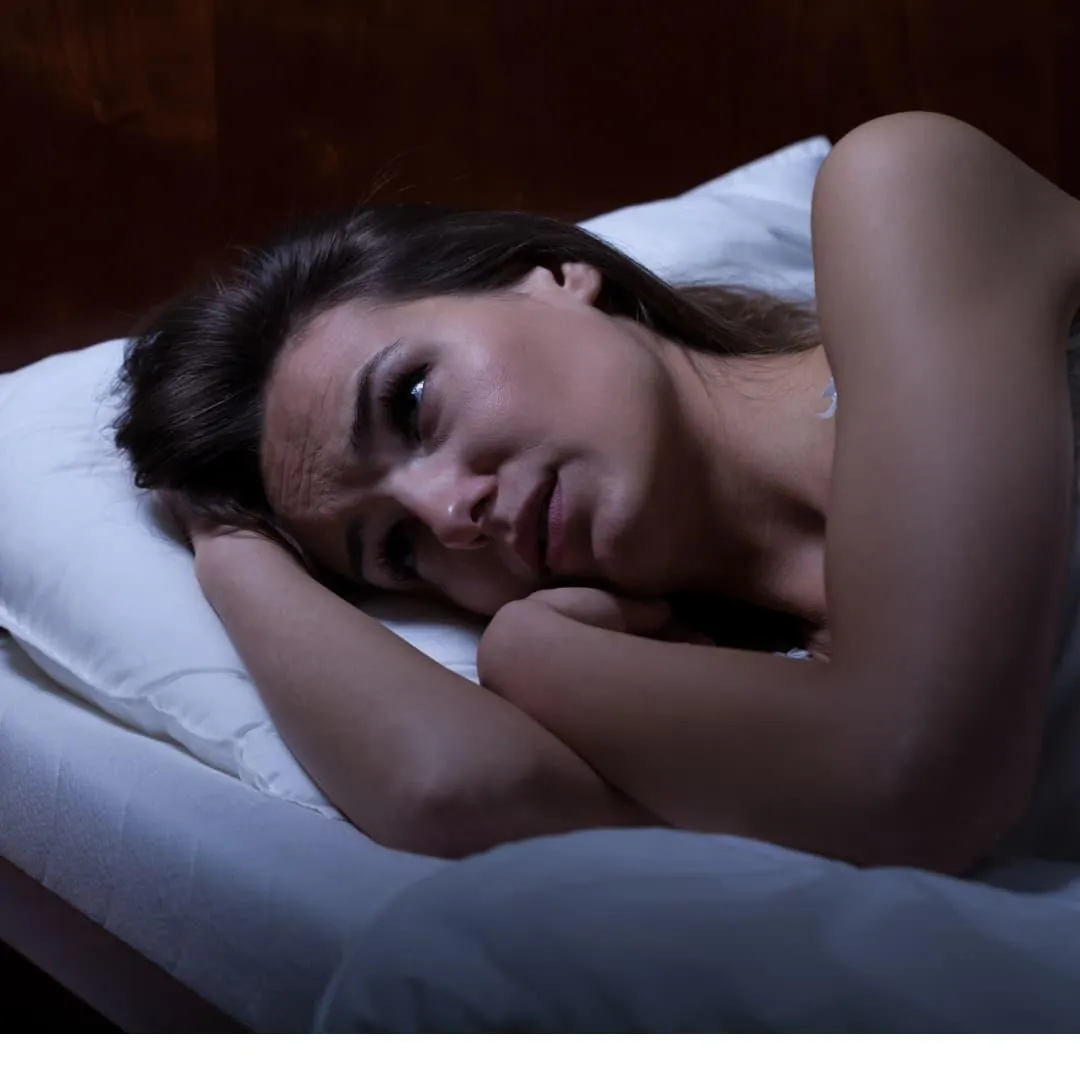*Open to Florida Residents
Blog
Blog

Elusive Sleep, Role Hormones Play
Elusive Sleep, Role Hormones Play
As women embark on the journey through menopause, understanding the interplay of estrogen, progesterone, and cortisol is essential in navigating the challenges that may arise in the realm of sleep. Approximately 40 to 60% of menopausal women report sleep related problems with the most common problem being nighttime awakenings.
Estrogen emerges as having a profound influence on the intricate tapestry of sleep regulation. Within the intricate circuitry of the brain, estrogen receptors are strategically positioned, creating a nexus between this hormone and neural processes that govern sleep-wake cycles. Estrogens involvement begins in the hypothalamus, the master regulator of circadian rhythms. Here, estrogen collaborates with neurotransmitters like serotonin and gamma-aminobutyric acid (GABBA), fostering an environment conducive to the onset of sleep. Estrogen’s role extends to the pineal gland, where it interacts with melatonin, the hormone responsible for ushering us into the realm of sleep.
Estrogen also plays a role in REM sleep, also known as rapid eye movement sleep, which is where our vivid dreams and cognitive function occur. Estrogen is found to influence the duration and intensity of REM sleep. Research suggests that high estrogen levels correlate with increased REM sleep.
Estrogen also plays a role in body temperature regulation. As women transition through the phases of menopause, estrogen’s decline disrupts the body’s ability to regulate temperature during sleep. Night sweats and hot flashes, often the protagonists in menopausal sleep disturbances, emerge as manifestations of the hormonal fluctuation.
As estrogen levels fluctuate during perimenopause and dwindle in menopause, insomnia begins to take center stage, leaving women tossing and turning in the wake of this hormone’s fluctuations.
Progesterone’s role in sleep lies in its interaction with gamma-aminobutyric acid (GABA), the primary inhibitory neurotransmitter in the brain. Progesterone enhances GABA’s effects, promoting a sense of tranquility and relaxation. This interaction creates a neuronal environment conducive to the onset and maintenance of sleep.
Progesterone also plays a role in respiratory regulation while you sleep. Progesterone has been shown to have respiratory stimulating effects which plays a crucial role in maintaining healthy breathing patterns.
With the perimenopausal phase begins the marked decline in progesterone levels which invites sleep disruptions and heightened sensitivity to stressors.
With the gradual decline of estrogen and progesterone it yields the stage to cortisol. This resulting change in hormone balance amplifies the vulnerability to stress-induced sleep disruptions, contributing to the overall sleep challenges menopausal women face.
Cortisol, produced by the adrenal glands, is a multifaceted hormone with a circadian rhythm that typically peaks in the early morning, providing a natural boost to wakefulness. However, in the perimenopausal and menopausal phase, cortisol’s begins to take center stage. Elevated stress levels, whether triggered by external stressors or internal changes in hormonal balance, propel cortisol into becoming a major player for sleep.
Cortisol when unleashed in excess interferes with sleep regulation. It stimulates alertness and can elevate heart rate, feelings of palpitations and even panic attacks. These symptoms lead to an unsuitable environment for sleep. External stressors amplify cortisol’s disruptive influence. Whether rooted in professional challenges, familial responsibilities, or the broader complexities of life, heightened stress levels further increase cortisol’s impact on sleep. This cumulative effect transforms the regulatory sleep pattern with cortisol surging late in the evening which contributes to insomnia.
Stress management techniques, such as yoga, meditation, and regular exercise become essential tools in the battle against cortisol induced sleep disturbances.
Hormone replacement therapy has been approved by the North American Menopause Society for sleep disturbances for women with bothersome night time hot flashes. It has been shown that hormone replacement therapy improves sleep in women with hot flashes and other vasomotor symptoms.
It is Recommended to have a sleep routine with comfortable bedding, appropriate room temperature and minimal light and noise which can enhance sleep quality.
For women aged 40-65 navigating menopause, the repercussions of insufficient sleep extend beyond mere fatigue. Elevated risks for cardiovascular issues, weight gain, cognitive decline, and mood disorders become potential companions on the journey of sleepless nights. Understanding the hormonal intricacies of sleep empowers women to promote hormone balance with hormone replacement therapy. The first step is acknowledging the profound connection between estrogen, progesterone, cortisol and sleep.

Elusive Sleep, Role Hormones Play
Elusive Sleep, Role Hormones Play
As women embark on the journey through menopause, understanding the interplay of estrogen, progesterone, and cortisol is essential in navigating the challenges that may arise in the realm of sleep. Approximately 40 to 60% of menopausal women report sleep related problems with the most common problem being nighttime awakenings.
Estrogen emerges as having a profound influence on the intricate tapestry of sleep regulation. Within the intricate circuitry of the brain, estrogen receptors are strategically positioned, creating a nexus between this hormone and neural processes that govern sleep-wake cycles. Estrogens involvement begins in the hypothalamus, the master regulator of circadian rhythms. Here, estrogen collaborates with neurotransmitters like serotonin and gamma-aminobutyric acid (GABBA), fostering an environment conducive to the onset of sleep. Estrogen’s role extends to the pineal gland, where it interacts with melatonin, the hormone responsible for ushering us into the realm of sleep.
Estrogen also plays a role in REM sleep, also known as rapid eye movement sleep, which is where our vivid dreams and cognitive function occur. Estrogen is found to influence the duration and intensity of REM sleep. Research suggests that high estrogen levels correlate with increased REM sleep.
Estrogen also plays a role in body temperature regulation. As women transition through the phases of menopause, estrogen’s decline disrupts the body’s ability to regulate temperature during sleep. Night sweats and hot flashes, often the protagonists in menopausal sleep disturbances, emerge as manifestations of the hormonal fluctuation.
As estrogen levels fluctuate during perimenopause and dwindle in menopause, insomnia begins to take center stage, leaving women tossing and turning in the wake of this hormone’s fluctuations.
Progesterone’s role in sleep lies in its interaction with gamma-aminobutyric acid (GABA), the primary inhibitory neurotransmitter in the brain. Progesterone enhances GABA’s effects, promoting a sense of tranquility and relaxation. This interaction creates a neuronal environment conducive to the onset and maintenance of sleep.
Progesterone also plays a role in respiratory regulation while you sleep. Progesterone has been shown to have respiratory stimulating effects which plays a crucial role in maintaining healthy breathing patterns.
With the perimenopausal phase begins the marked decline in progesterone levels which invites sleep disruptions and heightened sensitivity to stressors.
With the gradual decline of estrogen and progesterone it yields the stage to cortisol. This resulting change in hormone balance amplifies the vulnerability to stress-induced sleep disruptions, contributing to the overall sleep challenges menopausal women face.
Cortisol, produced by the adrenal glands, is a multifaceted hormone with a circadian rhythm that typically peaks in the early morning, providing a natural boost to wakefulness. However, in the perimenopausal and menopausal phase, cortisol’s begins to take center stage. Elevated stress levels, whether triggered by external stressors or internal changes in hormonal balance, propel cortisol into becoming a major player for sleep.
Cortisol when unleashed in excess interferes with sleep regulation. It stimulates alertness and can elevate heart rate, feelings of palpitations and even panic attacks. These symptoms lead to an unsuitable environment for sleep. External stressors amplify cortisol’s disruptive influence. Whether rooted in professional challenges, familial responsibilities, or the broader complexities of life, heightened stress levels further increase cortisol’s impact on sleep. This cumulative effect transforms the regulatory sleep pattern with cortisol surging late in the evening which contributes to insomnia.
Stress management techniques, such as yoga, meditation, and regular exercise become essential tools in the battle against cortisol induced sleep disturbances.
Hormone replacement therapy has been approved by the North American Menopause Society for sleep disturbances for women with bothersome night time hot flashes. It has been shown that hormone replacement therapy improves sleep in women with hot flashes and other vasomotor symptoms.
It is Recommended to have a sleep routine with comfortable bedding, appropriate room temperature and minimal light and noise which can enhance sleep quality.
For women aged 40-65 navigating menopause, the repercussions of insufficient sleep extend beyond mere fatigue. Elevated risks for cardiovascular issues, weight gain, cognitive decline, and mood disorders become potential companions on the journey of sleepless nights. Understanding the hormonal intricacies of sleep empowers women to promote hormone balance with hormone replacement therapy. The first step is acknowledging the profound connection between estrogen, progesterone, cortisol and sleep.
Let me help you achieve your goals.
Disclaimer: We understand that every individual's experience is unique and results may vary depending on various factors, such as attitude, adaptability, personal history, and overall health. For your safety and well-being, we highly recommend consulting your physician before beginning any program. At Elite Sexual Hormone Health, we do not diagnose, treat, or prescribe any medical or psychological disorders. We urge you to seek the care of a qualified physician or psychotherapist if you suffer from any psychological or medical disorder. Thank you for choosing Elite Sexual Hormone Health as your partner in your journey towards wellness.
© 2025, Elite Sexual Hormone Health. All rights reserved.
Privacy Policy | Terms of Service | Disclaimer
© 2025, Elite Sexual Hormone Health. All rights reserved.
Website by Hypnotherapy Accelerator





